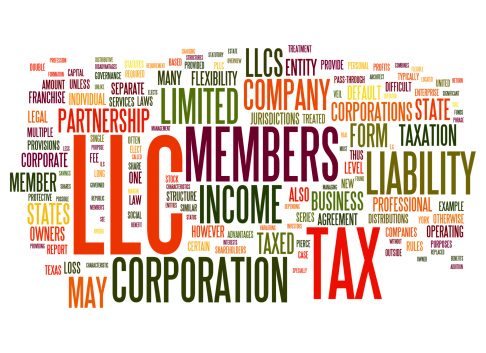Whether you’re a seasoned or aspiring landlord, you may have questions about the way your rental property business can be legally structured. You might not be sure about the best option based on your personal needs, liability concerns, and other factors.

Today, we’re going to discuss one type of business structure that landlords commonly use: an LLC. We’ll also go over other options that are available to you, discuss the advantages and disadvantages of each option, and help you decide whether or not a Maryland property management LLC is right for your rental property business.
An Overview of LLCs and Other Business Structures for Maryland Landlords
What is an LLC?
LLC stands for “limited liability company.” It’s a type of business structure that can be used for many types of companies – not just rental property businesses.
If you have an LLC, you must report all profits and losses on your personal income tax return since an LLC isn’t a taxable entity on its own (unless it has more than one owner). Establishing an LLC also protects your personal assets – if you owe money or are faced with a lawsuit, only your business assets are put at risk.
What other options do landlords have for establishing a business?
If you want to establish an official business, you have a few choices for ways to go about it. Let’s talk about two of your choices, and then we’ll talk about LLCs. As you’ll see, each option has its own set of pros and cons.
Sole proprietorship
A sole proprietorship is a one-person business. If you choose to establish your rental property business as a sole proprietorship, you do not need to register with the state. So, if you’re a landlord who isn’t on an employer’s payroll, there’s a good chance you are already a sole proprietor.
While this type of business is easy to set up, it doesn’t offer protection for your personal assets. In other words, a creditor can come after your personal possessions if you face a debt or lose a lawsuit in relation to your rental property business.
Corporation
To form a corporation, you’ll need to take certain steps like filing articles of incorporation and setting up a corporate records book. You’ll also need to pay a fee (which varies by state), making it more costly and time-consuming than establishing a sole proprietorship.
However, a corporation provides personal asset protection that a sole proprietorship does not, and establishing one may also give you certain tax advantages.
Tip: Check out this blog post to learn how to form a corporation in Maryland.
Why might a landlord choose to establish a Maryland Property Management LLC?
One of the main reasons a landlord might choose to establish an LLC is for personal asset protection.

It’s not uncommon for landlords to deal with lawsuits from angry tenants or to go into debt when starting their rental property business. But, by establishing your rental property business as an LLC, you can make sure that you do not lose your personal assets as the result of either of those scenarios.
The added peace of mind you get when you establish an LLC could make your job as a landlord significantly less stressful – this is the main reason many landlords choose to establish an LLC.
Why might a landlord not choose to establish an LLC?
One reason you may not want to establish an LLC is because it doesn’t completely limit your personal liability. For example, if you neglected to make an important repair at a property and a tenant became injured as a result, you (as an individual) would likely be held liable for their injury.
Your personal finances may also go unprotected if you do not keep your business finances and your personal finances in separate bank accounts, even if you form an LLC. Make sure you keep your finances completely separate and refrain from making personal purchases with company money.
Another reason a landlord may avoid establishing a Maryland property management LLC is the upfront cost. If you choose to hire an attorney to create an LLC for you, you could be looking at $1000 or more.
However, you also have the option to create an LLC yourself online. Fees vary by state, but a Maryland LLC costs a one-time fee of $100 if you choose to do it yourself. If you want to get Certified Copies of the document or a Certificate of Status when you file, it’ll cost you a little more.
In other states, the cost of establishing an LLC is even higher. So, if you’re a Maryland landlord, consider yourself lucky – you’ve got a chance to form an LLC for a relatively low fee compared to what many other entrepreneurs in the country have to deal with.
One more thing you may want to consider before you establish an LLC…
If your insurance coverage (landlord’s insurance and renter’s insurance) provides plenty of protection from liability, you may not need the protection offered by an LLC. Check with a professional who has worked with landlords in the past to make sure you’re not putting yourself at risk if you choose not to establish an LLC for your rental property business.
Is establishing an LLC a good idea for landlords?
Setting up an LLC makes sense if you’re looking to decrease risk and protect your personal assets. If you do, you’ll probably want to talk to an accountant about your finances and taxes and an attorney about any details of your LLC that you’re unsure about.

How can a landlord establish an LLC?
Like we discussed earlier in this post, you can either establish an LLC yourself or hire an attorney to take care of it for you. If you’d like to do it yourself, follow these steps:
- Pick a name for your LLC. Make sure the name complies with your state’s LLC naming rules.
- File “articles of organization.” This must be done with your state’s LLC filing office, and you’ll need to pay your state’s filing fees.
- Create an operating agreement for your LLC. In your agreement, you’ll create rules about the way your business is operated.
- Publish a notice in your local newspaper (not required in every state). This notice must state that you intend to form an LLC. If this is a requirement in your state, contact your local newspaper to learn the exact steps you must take.
Once you’re done creating your LLC, make sure you get any necessary licenses and permits before you officially open up for business.
Hopefully, this blog post has helped you better understand the basics of how to form an LLC and why you might want to do so.
Even after you’ve taken in all of this information, you may still find it difficult to decide how to structure your rental property business – and that’s okay. Just make sure you do your research before choosing so you aren’t putting your business and/or personal assets in jeopardy.
